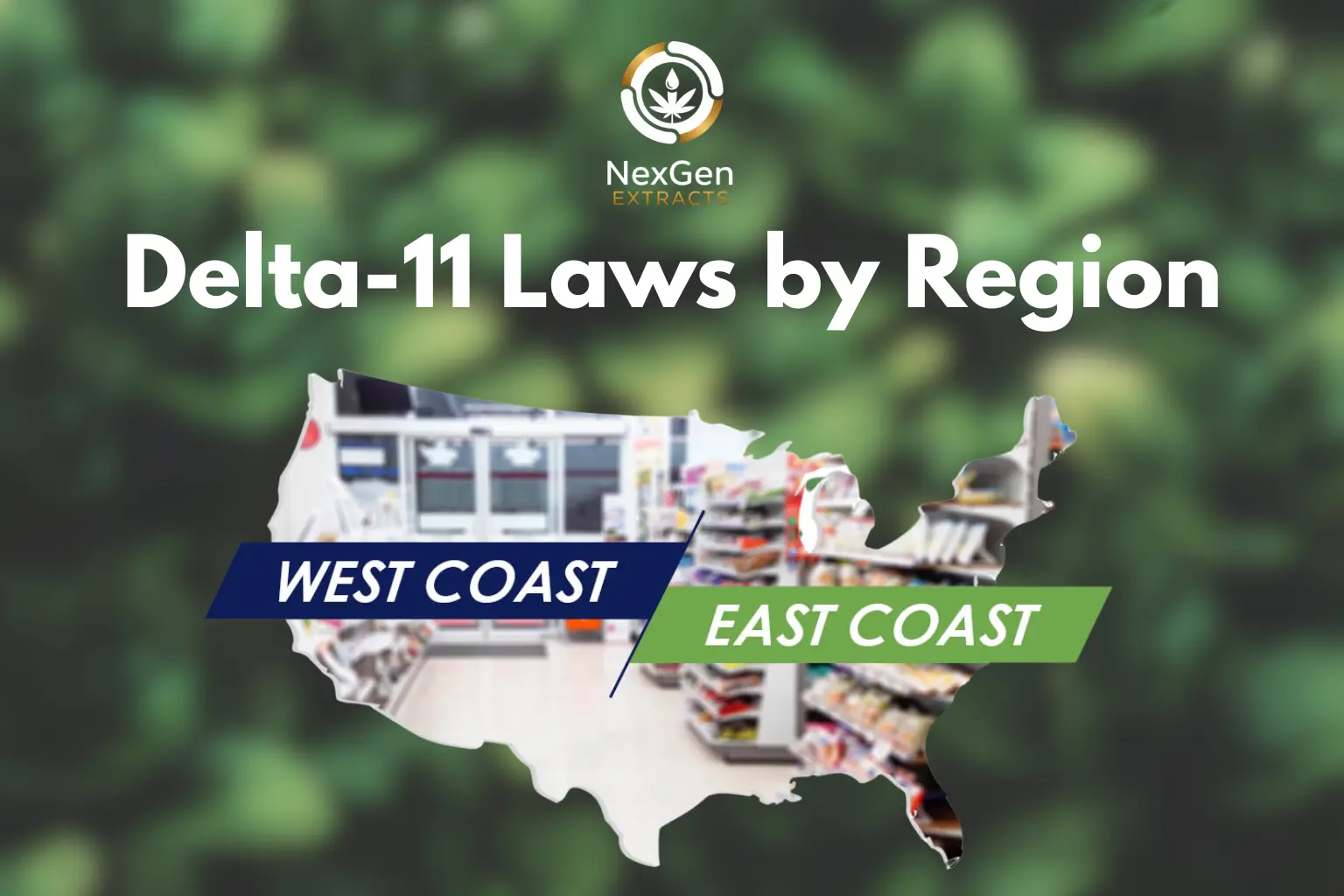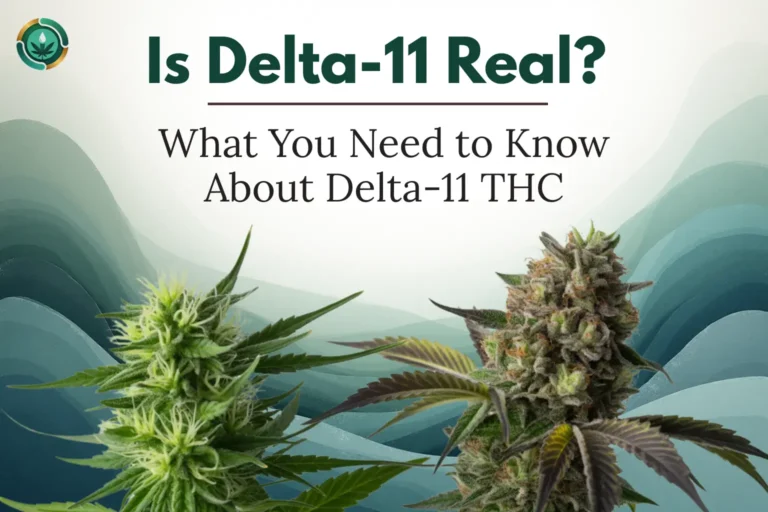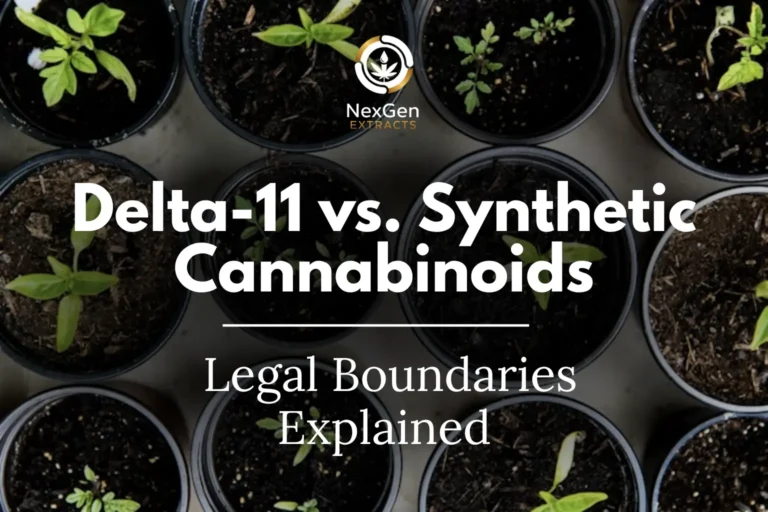
Introduction
The hemp and cannabis industry in the United States is evolving faster than ever. With new cannabinoids emerging, one name now catching attention is Delta-11 THC. Known for its euphoric yet balanced effects, Delta-11 has quickly entered the hemp product market. However, its legal status remains a confusing subject, varying greatly from state to state.
This article explores how Delta-11 laws differ between the East Coast and the West Coast, why those differences exist, and what consumers and brands must know to stay compliant.
What Is Delta-11 THC?
Delta-11 THC, or Δ11-tetrahydrocannabinol, is one of the many cannabinoids found naturally in the cannabis and hemp plants. It’s structurally similar to Delta-9 THC, the main psychoactive compound in marijuana, but interacts with the body’s endocannabinoid system in a slightly different way.
Delta-11 offers users a mild, uplifting, and relaxing high. Some report a stronger sense of clarity compared to Delta-8 or Delta-10. Because it’s typically hemp-derived, Delta-11 can technically fall under federal legality, provided it meets the 0.3% Delta-9 THC limit established by the 2018 Farm Bill.
Still, every state has the power to interpret and enforce these rules differently — and that’s where the regional divide begins.
The Federal Framework
The foundation of Delta-11’s legality starts with the 2018 Farm Bill. This legislation federally legalized hemp and all its derivatives, extracts, and cannabinoids — as long as the Delta-9 THC concentration does not exceed 0.3% on a dry-weight basis.
Because Delta-11 can be derived from legal hemp, it’s technically federally legal. But there’s a catch: the Farm Bill does not explicitly mention Delta-11 or any other THC isomer. That leaves plenty of room for state authorities to interpret these cannabinoids as controlled substances if they choose to.
This legal ambiguity has led to a patchwork of laws across the United States, with the East Coast and West Coast taking notably different approaches.
East Coast Overview
On the East Coast, cannabis laws have historically been more conservative. While several states have legalized recreational or medical marijuana, many remain cautious about psychoactive hemp derivatives like Delta-11.
States such as New York, New Jersey, Massachusetts, and Maine have built complex cannabis regulatory systems, but they handle hemp-derived THC products differently. In many cases, hemp-derived Delta-11 is restricted or unregulated, leading to confusion among consumers and retailers alike.
Let’s break down how some major East Coast states treat Delta-11.
Delta-11 Laws in New York
New York has legalized recreational cannabis, yet its hemp regulations are strict. The state bans the sale of synthetically derived cannabinoids, which includes isomers like Delta-8, Delta-10, and potentially Delta-11 if it’s created through chemical conversion from CBD.
In other words, unless Delta-11 occurs naturally in hemp, it might not be permitted for retail sale. The state’s position remains under review, but most hemp-derived THC products are still prohibited under current rules.
Delta-11 in New Jersey
New Jersey legalized adult-use cannabis in 2021, but hemp-derived THC compounds remain in a gray zone. The state has not explicitly banned Delta-11, but the New Jersey Cannabis Regulatory Commission emphasizes that all psychoactive cannabinoids require testing, labeling, and compliance under cannabis rules.
As a result, Delta-11 products may be temporarily tolerated but are subject to future restrictions. Retailers should monitor state updates closely.
Delta-11 in Massachusetts
Massachusetts follows a similar pattern. Although the state legalized recreational cannabis years ago, the Massachusetts Department of Agricultural Resources has banned the sale of hemp-derived cannabinoids intended for human consumption, including Delta-8 and likely Delta-11.
Thus, Delta-11 is not legally sold in hemp form in Massachusetts, even though cannabis dispensaries can sell Delta-9 THC products derived from marijuana. This contradiction highlights how state laws can favor licensed cannabis markets over the hemp industry.
Delta-11 in Florida
Florida is one of the most hemp-friendly states on the East Coast. Under the state’s Hemp Program, cannabinoids derived from legal hemp — including Delta-8, Delta-10, and Delta-11 — are permitted as long as the products contain less than 0.3% Delta-9 THC.
Florida regulators do require accurate labeling and third-party testing, but they haven’t banned hemp-derived THC isomers. This makes Florida a key East Coast hub for Delta-11 vapes, gummies, and tinctures.
Delta-11 in the Carolinas
In both North Carolina and South Carolina, hemp-derived cannabinoids are technically legal under federal law, since neither state has banned them outright. However, neither has developed specific Delta-11 THC regulations.
This means Delta-11 products can be sold in these states, but sellers operate in a loosely regulated market. Consumers should always verify Certificates of Analysis (COAs) to ensure safety and legality.
East Coast Summary
Overall, the East Coast presents a mixed picture. States with mature cannabis programs tend to restrict hemp-derived THC isomers, while those with limited cannabis access remain more lenient.
For now, consumers in Florida, North Carolina, and South Carolina can purchase Delta-11 freely, while states like New York and Massachusetts maintain tighter control.
The West Coast Perspective
On the West Coast, cannabis culture runs deep. States like California, Oregon, and Washington pioneered legalization and continue to influence national cannabis policy. However, this progressive stance doesn’t always translate into freedom for hemp-derived cannabinoids like Delta-11.
Most West Coast states have drawn a clear line between cannabis and hemp, prioritizing the licensed marijuana market and discouraging unregulated hemp-derived THC sales.
Delta-11 in California
California was among the first states to legalize cannabis, but its regulators have taken a strict stance on hemp-derived THC. The California Department of Public Health bans the sale of hemp-derived cannabinoids — including Delta-8, Delta-10, and likely Delta-11 — in products intended for human consumption.
Only licensed cannabis dispensaries can sell psychoactive THC products, even if they’re hemp-derived. That means Delta-11 gummies or vapes made from hemp cannot be sold legally outside the state’s regulated cannabis system.
Delta-11 in Oregon
Oregon’s cannabis market is one of the most developed in the country, yet its approach mirrors California’s. The Oregon Liquor and Cannabis Commission (OLCC) has banned the sale of chemically converted cannabinoids like Delta-11 in general retail.
These products can only be sold within the state’s licensed cannabis framework, and they must meet strict testing requirements. The move aims to ensure product safety and prevent contamination, but it effectively shuts down most hemp-derived Delta-11 sales.
Delta-11 in Washington
Washington State enforces similar restrictions. In 2022, regulators confirmed that synthetic or chemically modified cannabinoids are prohibited outside the regulated cannabis market.
This means that hemp-derived Delta-11 products are illegal in Washington unless produced by licensed cannabis companies and sold through approved dispensaries.
Delta-11 in Nevada
Nevada takes a more moderate position. The state legalized cannabis for both recreational and medical use, but it hasn’t completely banned hemp-derived cannabinoids.
However, all psychoactive cannabinoids, including Delta-11, must comply with Nevada Cannabis Compliance Board (CCB) testing and labeling standards. This approach allows Delta-11 products to exist under tight regulation, promoting consumer safety without banning them outright.
West Coast Summary
In general, the West Coast states favor a controlled and regulated cannabis industry. Most of them treat Delta-11 as a THC analog — subject to the same rules as marijuana-derived THC.
That means consumers can find Delta-11 products only in licensed dispensaries, not in regular hemp shops or online stores. The focus here is consumer protection, ensuring all psychoactive products meet the same testing standards.
East vs. West: The Core Difference
The main distinction between the East Coast and West Coast comes down to regulation philosophy.
-
East Coast: Many states are still building cannabis frameworks, so hemp-derived cannabinoids like Delta-11 often fill legal gaps. Some states tolerate them; others don’t.
-
West Coast: Cannabis is already legal and tightly regulated. As a result, hemp-derived THC isomers like Delta-11 are generally restricted to the licensed cannabis system.
This divide shows how state priorities shape the hemp industry. While East Coast states explore hemp freedom, West Coast regulators focus on market control and public safety.
The Role of the DEA and the Federal Analogue Act
Another legal factor is the Federal Analogue Act, which allows authorities to classify any compound similar to a Schedule I substance as illegal.
Although Delta-11 THC isn’t explicitly listed as a controlled substance, it’s chemically similar to Delta-9. This means it could be subject to interpretation under the Analogue Act if regulators decide it was “intended for human consumption.”
So far, the DEA has not targeted Delta-11 specifically. However, as its popularity grows, federal scrutiny may increase.
What Consumers Should Know
Whether you’re on the East Coast or West Coast, it’s essential to understand local laws before purchasing Delta-11 THC.
-
Always verify COAs (Certificates of Analysis).
Buy only from brands that publish lab results confirming hemp origin and Delta-9 THC compliance. -
Know your state’s hemp law.
Laws change often, and ignorance won’t protect you from penalties. -
Avoid unregulated sources.
Illegally manufactured Delta-11 can contain harmful residues or mislabeled potency.
By choosing reputable brands and verified products, consumers can safely enjoy Delta-11 without crossing legal boundaries.
Future Outlook
The future of Delta-11 THC in America depends on upcoming regulatory clarity. Federal lawmakers may eventually amend the Farm Bill or introduce new hemp regulations to define psychoactive cannabinoids more precisely.
States will likely continue refining their rules, either embracing hemp-derived innovation or restricting it to protect their licensed cannabis industries.
One thing is clear — Delta-11 is here to stay. As long as consumers demand alternative cannabinoids with controlled psychoactive effects, producers will keep innovating responsibly within legal limits.
Conclusion
Delta-11 THC sits at the crossroads of hemp innovation and state regulation. On the East Coast, its legality varies — open in some states and banned in others. On the West Coast, it’s mostly confined to the regulated cannabis system, prioritizing oversight and consumer safety.
For consumers and brands alike, staying informed, compliant, and transparent is the key to navigating these evolving laws. As hemp science advances and regulations mature, Delta-11 may eventually find a consistent legal home across the United States.
At NexGen Extracts, we believe in empowering consumers through education, transparency, and trust — because understanding the law is as important as enjoying the product.


